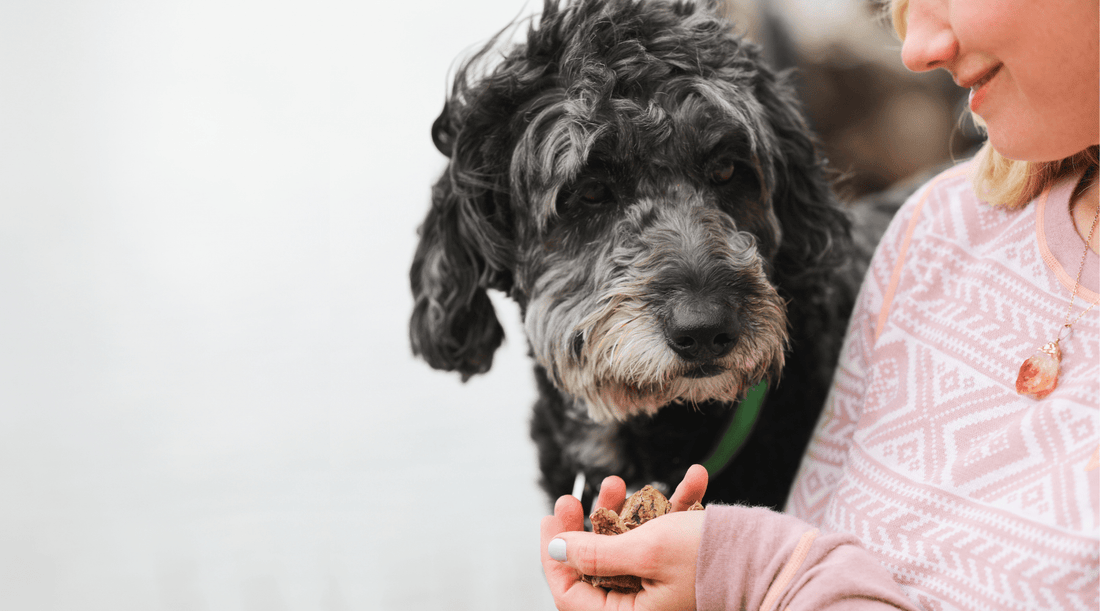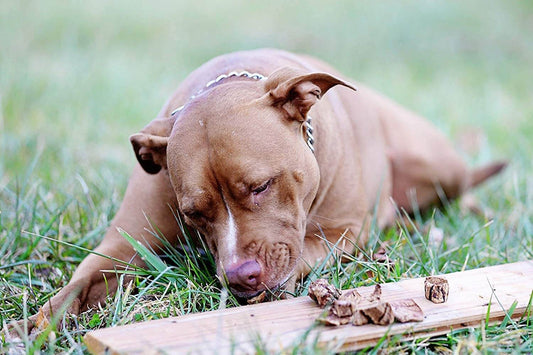
Gut Health for Dogs: The Tale of a Temperamental Tummy
Dawn Miller Dec 17, 20245 Minute ReadThe other day, I was catching up with an old friend from high school. She mentioned her senior Maltese, Carlos has been struggling with a temperamental tummy. She said he’s been more finicky about food, occasionally has a dog upset stomach, and just doesn’t seem as enthused about life as he used to.
Something's wrong. And she mentioned that our furry companions can't tell us outright when they feel sick. We have to look for the signs.
As a devoted dog mom with three energetic pups of my own, I get it. Gut health plays a huge role in our dogs’ overall well-being—just like it does for us. I told her, “Let’s figure out what’s going on with Carlos' tummy together.” That’s where our conversation began exploring gut health for dogs and its impact on overall dog health.
Why Gut Health for Dogs Is So Important
Like your gut or mine, the dog digestive tract is the engine that keeps the body running. It must extract energy and nutrients efficiently and keep the gut microbiome healthy and happy for overall health.
A balanced gut microbiome makes efficient digestion possible. But advances in gut health science are learning that the types of organisms in a gut can impact everything from how well a dog can fight off infections to their mood and energy levels.
You can tell when your dog's gut is in good shape, when they:
- Eat well
- Have energy
- Show enjoyment for life
- Want to engage in activities they've always loved
- Enjoy spending time with you and their housemates
Then, what does an off-balance gut look like?
Signs of Dog Upset Stomach
It's night and day with symptoms like:
- Loose stools
- Accidents
- Lack of appetite
- Lower energy
- Hiding or sleeping a lot
- Vomiting
If these digestive issues aren't addressed, they may begin to show signs of malnutrition:
- Unexplained weight loss
- Itchy skin
- Wiry hair
- Obvious joint discomfort
- Disinterest in everything, including their #1 Human 😞
What Is Good for Dogs Gut Health?
As we discussed Carlos' gut health, several factors came up. We did some googling and shared things our dogs' veterinarians had recommended. Of course, I had to jump in with things I'd learned over the years.
1. Choose High-Quality, Digestible Foods
Dogs live their best when they eat nutrient-dense, digestible foods that are ancestrally appropriate. In the wild, dogs eat meat, including organ meat and connective tissues, along with various plants. Wolves and wild dogs are known to eat berries, seeds, apples, acorns, figs, plums, carrots, melons, squash/pumpkin, and even grass, which help them eliminate parasites in their guts. When these wild canines can steal it from unsuspecting humans, they also enjoy probiotic-rich cheese and yogurt in small amounts.
Veterinarian-approved kibble contains some of these ingredients and seeks to mimic the natural diet of the dog or wolf.
But some dog treats don't take the same care and may upset your dog's stomach.
Fillers, artificial additives, plastics, wood pulp, rawhide tanning chemicals, and added sugar are not normal for a dog's diet. So, it's no wonder that dog treats that contain these can cause digestive problems that worsen as a dog ages.
2. Give Them Collagen Rich Foods
Collagen is critical for digestive health. It's a structural protein. And dogs need lots of protein for a healthy gut.
In addition to all the other great things you've heard about collagen for skin, joints, and coats, it also makes up the digestive tract lining. When this lining is worn and thin, dogs experience digestive symptoms, irritation, and chronic inflammation that can spread throughout the body. The gut microbiome also favors less friendly visitors, like harmful bacteria and viruses.
In addition to the localized problems that a lack of collagen can cause, an inflamed digestive tract doesn't efficiently absorb nutrients, worsening health problems over time.
3. Avoid Table Scraps
I know it’s tempting—those puppy-dog eyes are hard to resist! But human food, especially excessive fatty foods, can throw your dog’s gut out of balance and lead to an upset stomach. Plus, some food scraps—like dinner bones—look perfect for dogs. But they can get stuck and tear the digestive tract.
If you want to give your dog a dog bone for better dog health, there's a safer way to do it.
4. Choose Healthy Treats for Dogs
Dog bones and treats are an essential part of dog life and gut health. They help me show affection, positively reinforce desired behaviors, and supplement their nutrition. They can also clean their teeth, supporting overall dog health.
Healthy, digestible treats will be something that my pups' ancestral wolves would eat by choice. The right dog bones and treats are single ingredient and all-natural. They're safe to consume and digestible.
They're not only nutrient-dense. They should also contain nutrition that dogs may not get from a kibble-only diet.
For starters, my dogs get their gut-healthy dog treats:
- Omega 3 for heart and brain health as well as anti-inflammation
- Collagen protein for a healthy gut
- Glucosamine for bladder health and joint support
- B12 for mood and energy
- Calcium
These are found in a grass-fed beef dog bone or treat. I only chose grass-fed beef because it has more than 2X the omega-3 healthy fat and less saturated fat than those from conventionally raised herds.
Are Bones Digestible for Dogs?
Yes. A dog bone is very digestible. But not how you might think.
Marrow-filled dog bones contain naturally-occurring bone marrow. This is where most of the nutrition is. Chewing on bones is an instinctual behavior for a dog. They find it very entertaining and rewarding. As they chew, lick, and turn the bone, it releases a little marrow.
This stuff is rich. So, they only need a small amount.
Regarding gut health, it's important to limit dog bone time to 15-20 minutes because marrow does have significant fat, which can cause dog upset stomachs when overdone—even doggy diarrhea. But in moderation, nutrition can have the opposite effect.
Healthy Treats for Dogs...The Dog Gut Health Edition
Here are some of my dog's favorite digestible, all-natural dog treats.
Beef Lung Bites
It's an organ meat treat! So it's super healthy. They're small and extra-rich in collagen protein for gut health and lower in fat than marrow bones, making them a great option for introducing a dog like Carlos, who already has a temperamental tummy, to an all-natural treat. I get these in a bulk bag. The bag lasts for up to two years.
You can find the ones my dogs recommend here.
Dynamo Bone
This marrow-filled dog bone is another nutritious, gut-friendly option. Just follow that moderation rule to maximize the benefits. Introduce slowly for dogs who already have dog upset stomachs. You can find Dynamo bones here.
I also like to refill these with those other foods dogs like to eat in the wild to vary their diet. So, berries with Greek yogurt or cheese and pumpkin can go inside the bone after the marrow is mostly gone. This makes a dog bone last even longer. It helps them get every last bit of that marrow out. Get some recipe ideas in this free, downloadable dog bone refill guide.
Available On:





